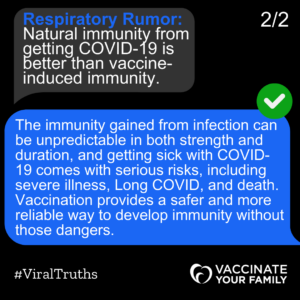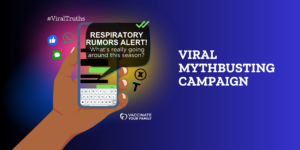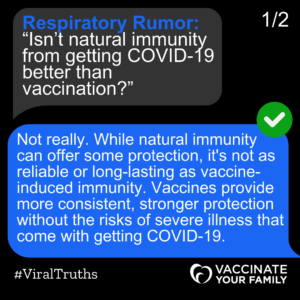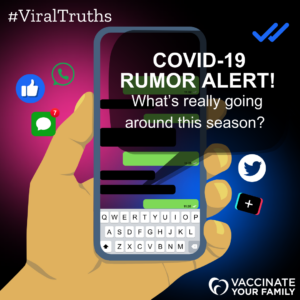Stay safe and vaccinate: the risks of natural immunity
COVID-19 vaccines save lives, prevent serious complications, and are the safest way to build immunity to COVID-19.
COVID-19 is not “just a cold.” According to the CDC, as of June 1, 2024, nearly 1.2 million people have died of COVID-19 in the U.S. and even more have been hospitalized. COVID-19 can cause serious complications, and treating these complications can significantly strain our healthcare system. Infection from COVID-19 comes with dangerous acute and long-term health risks, and creates ripple effects that impact productivity, the economy, and the wellbeing of entire communities.
To prepare for the upcoming respiratory disease season, COVID-19 vaccines have recently been updated to better match circulating strains of the virus. Similar to flu vaccines, COVID-19 vaccines are proven to be effective at preventing serious illness and complications, including death, from COVID-19. Though the protection they provide isn’t always perfect – you CAN still get sick with COVID-19 if you get a COVID-19 vaccine – studies have shown that COVID-19 vaccination provides safer, longer-lasting, and more effective protection than natural immunity.
Natural immunity poses significant risk
Immunity to a disease is acquired through either exposure to an actual germ, which is called “natural immunity,” or through vaccination, which teaches your immune system to build protection without exposing you to the thing that can make you sick. Vaccination is safer than natural immunity because it introduces a disease to your immune system in a controlled manner. Vaccines teach the body how to build protection to a disease without the risks of serious acute and long-term complications that can occur from a true infection.
In the case of COVID-19, symptoms can be mild, moderate, severe, or even critical. Some people are more at risk for severe or critical illness from COVID-19, such as older adults, pregnant people, or folks who are immunocompromised or have underlying health conditions. However, people who were previously healthy have been hospitalized, and have even died, from COVID-19, so it can be difficult to predict how a person will respond to this virus.
Recovery from a COVID-19 infection can vary and be unpredictable. Even people who had mild COVID-19 cases can develop a debilitating condition called Long COVID, a chronic illness that consists of lingering symptoms following a COVID-19 infection. This condition can happen to anyone, but it’s seen more often in women, Hispanic and Latino people, and folks who are unvaccinated. Since the chances of developing Long COVID seem to increase with each infection, the best way to prevent Long COVID is to prevent COVID-19 infection and get vaccinated, as COVID-19 vaccination may also prevent Long COVID.
All COVID-19 infections pose a risk of serious, chronic, or deadly disease. Don’t take a chance – get vaccinated.
Immunity from COVID-19 vaccines is more reliable and long-lasting
If infected with COVID-19, your immune system should protect you against reinfection for a few months, but this protection weakens over time and can vary by person. According to the CDC, people with weakened immune systems who are infected with COVID-19 may have a limited immune response or none at all, meaning they build little or no protection from a COVID-19 infection. COVID-19 is a rapidly changing virus, so new variants can evade the protection your immune system built from a previous infection. The best way to prevent reinfection and serious complications from COVID-19 is to stay up to date on updated COVID-19 vaccines.
COVID-19 vaccines prevent the spread of the virus
COVID-19 is a highly contagious respiratory virus that spreads through airborne particles and droplets. The virus is most contagious in the early stages of illness, which means that people can spread COVID-19 before they feel sick and begin to experience symptoms. Some people who have COVID-19 never develop symptoms, so they unknowingly spread COVID-19 at work, home, and in public spaces like restaurants and grocery stores. If you have respiratory symptoms of any kind, it’s a good idea to wear a mask to potentially avoid spreading your germs to those around you.
Updated COVID-19 vaccines are the best tool we have for not only protecting ourselves from serious or deadly illness, but also protecting the more vulnerable folks around us. While COVID-19 might be a mild illness for one person, that person can spread the virus to other people who are high risk, like older adults, children, pregnant people, and those with chronic health conditions. Getting vaccinated is a safe and effective way to help keep your community healthy.

What’s Really Going Around This Season?
Fall and winter bring a surge in respiratory viruses like flu, COVID, RSV, and the common cold—and with them, plenty of misinformation. Vaccinate Your Family (VYF) is here to help with our new Viral Mythbusting Campaign! Get the facts, debunk the myths, and stay informed. Check back weekly for new blog posts tackling the latest viral rumors and learn how to protect your family and community this season!
You can participate in our Viral Mythbusting Campaign by sharing the importance of busting respiratory disease myths on your social media platforms. VYF offers a free downloadable toolkit that follows an evidence-based format for combatting misinformation: lead with the fact, warn about the myth, explain how the myth misleads, and finish with the fact. Sometimes called a “truth sandwich,” this is a proven way to address respiratory rumors.
To join:
- Visit our campaign webpage
- Access our campaign toolkit
- Share any time during this respiratory disease season
- Use hashtag #ViralTruths and tag @vaccinateyourfamily on IG and FB, @vaxyourfam on X so we can amplify your posts!
To find drafted COVID myths social copy and downloadable graphics, click here.

Additional Resources
VYF provides up-to-date information on vaccine safety and access on our website. View our current programs to learn more about our services and ways to get involved.
For more information:
